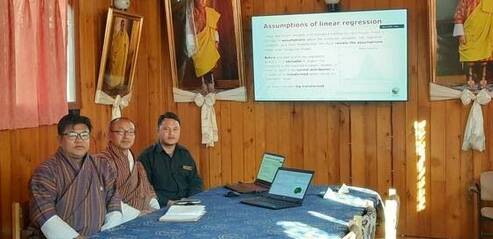
The project aims to support the collection, harmonization and effective management of soil information in the countries that participate in the Asian Food and Agriculture Cooperation Initiative (AFACI).
Preparation of the Soil Atlas of Asia through the update of national soil maps and National Soil Information Systems for AFACI Countries
This project supports the collection, harmonization and effective management of soil information in the countries that participate in the Asian Food and Agriculture Cooperation Initiative (AFACI). The activities are directed at building capacities to help every country to develop its own soil information system for supporting evidence-based decision making in sustainable soil management, and for national reporting to the United Nations conventions on desertification and climate change. The project covers all stages of developing soil information systems, including the rescue of soil profile data and soil maps, harmonisation of soil maps in the framework of the Soil Atlas of Asia, preparation of national soil profile databases, soil property maps and supplementary data layers, establishment of web-based spatial data infrastructure and an online learning platform. The essential part of the process is the capacity building that enables national experts to efficiently manage soil data through the soil information systems and to deliver nationally and internationally required products. Through harmonization of soil data and maps, the project fosters regional and international collaboration, promote soil data sharing and scientific exchange. Lastly, it contributes to the GSP’s Global Soil Information System (GLOSIS) bringing the data of the national information systems to a global scale.
IMPACT AND OUTCOME
The direct impact of the project is to strengthen and harmonize national soil information systems while making them available and interoperable at the regional and global level. The indirect impact is associated with products of this project in the form of Atlases, maps, manuals, guidelines and technical specifications with potential for supporting (1) evidence-based decision making in soil management, (2) the development and review of legal framework on soil, and (3) countries in achieving and reporting on the SDGs.
The outcome is to enhance the capacity of AFACI countries on soil data management and processing for increasing soil data interoperability, soil maps development and the establishment or strengthening of national soil information systems under GLOSIS. By achieving this objective, the project aims to support the broader goals of the Asian Soil Partnership:
- Build consistent and updated national and regional soil information systems to contribute to GLOSIS;
- Share and transfer soil knowledge and new technology within and beyond the region;
- Provide soil information to all those with an interest in sustainable soil and land management;
- Train a new generation of experts in soil science and management.
To achieve these results, the following outputs were developed.
- Output 1: National soil type maps are prepared. Output 1 involves finalizing and harmonizing national soil maps for AFACI countries and integrating them into the Soil Atlas of Asia.
- Output 2: National soil profile databases and gridded maps of soil properties and threats are produced. Output 2 compiles soil data in AFACI countries to support evidence-based decision-making and lay the groundwork for soil information systems, with selected maps featured in the Soil Atlas of Asia.
- Output 3: National soil information systems are established.
KEY FACTS
Target countries: Afghanistan, Bangladesh, Bhutan, Brunei Darussalam, Cambodia, China, the Democratic People’s Republic of Korea, India, Indonesia, Japan, the Lao People’s Democratic Republic, Malaysia, Maldives, Mongolia, Mongolia, Myanmar, Nepal, Pakistan, the Philippines, the Republic of Korea, Singapore, Sri Lanka, Thailand, Timor-Leste and Viet Nam, Bahrain, Egypt (Sinai) the Islamic Republic of Iran, Iraq, Jordan, Kuwait, Lebanon, Oman, Qatar, Saudi Arabia, the Sudan, the Syrian Arab Republic, the United Arab Emirates, Yemen, Occupied Palestinian Territory, Armenia, Azerbaijan, Kazakhstan, Kyrgyzstan, the Russian Federation (Asian part), Tajikistan, Türkiye, Turkmenistan and Uzbekistan.
Contribution: 1 400 000 USD
Duration: 2019 - 2023
Resource partners: Rural Development Administration (RDA) of the Republic of Korea and the Asian Food and Agriculture Cooperation Initiative (AFACI)
Project code: GGCP/GLO/031_ROK
Project Title: Preparation of the Soil Atlas of Asia through the update of national soil maps and National Soil Information Systems for AFACI Countries
Contacts: GSP Secretariat, Marcos Angelini.
